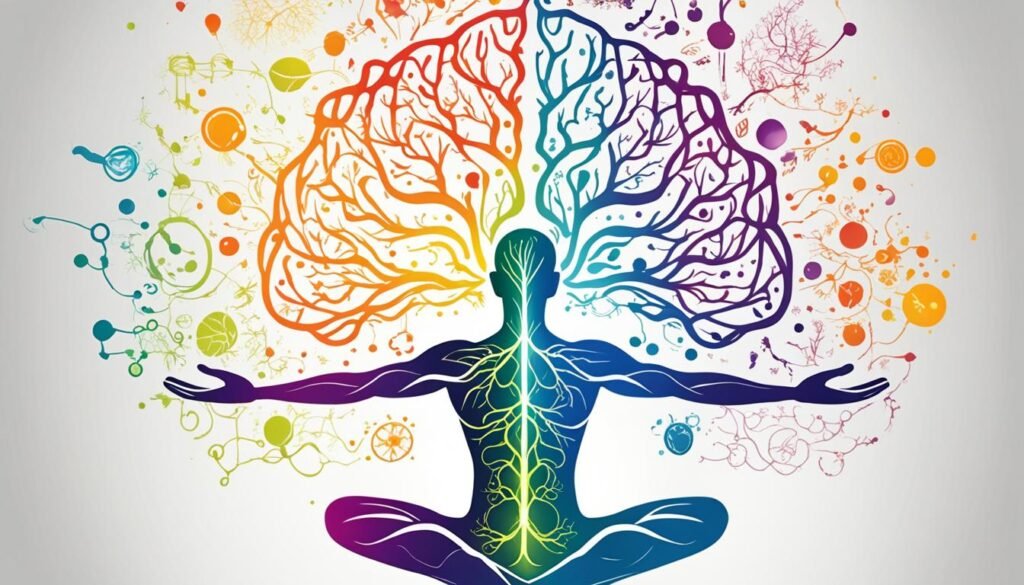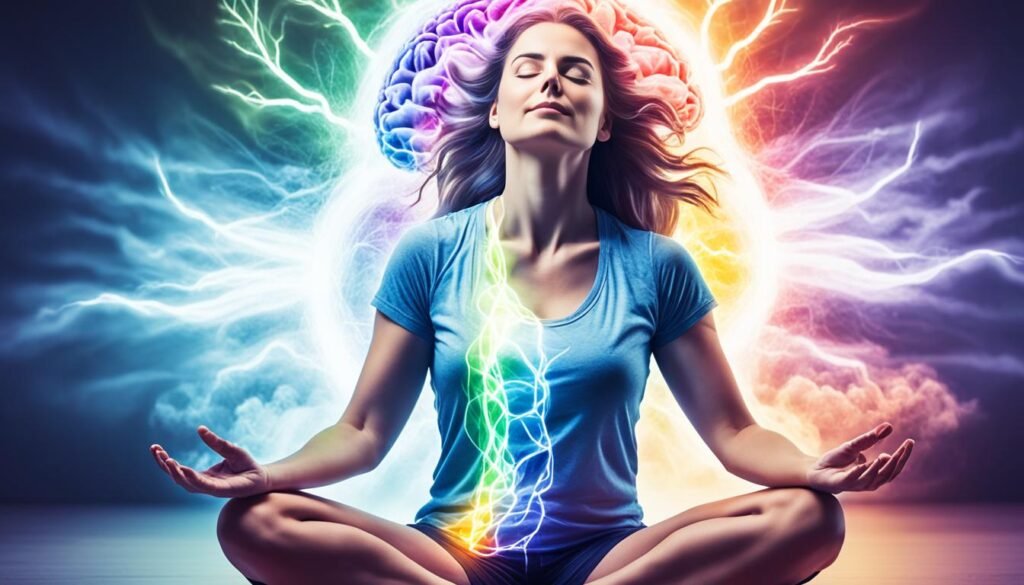In today’s fast-paced world, prioritizing mental wellness has never been more crucial. As a psychiatric medical provider passionate about holistic well-being, I am excited to delve into the profound link between our minds and bodies, particularly the transformative impact of integrating physical activity into our daily routines. Exercise serves as a powerful adjunct to traditional psychiatric treatments, offering a holistic approach to mental wellness. Discovering the powerful benefits of the body-mind connection – reduced stress, enhanced well-being, and improved self-awareness through mindfulness techniques and holistic practices – can be truly transformative.
Profound Impact of Physical Activity on Mental Wellness
Numerous studies highlight the undeniable connection between physical activity and mental health. According to the World Health Organization, regular exercise has been shown to reduce the risk of depression by a staggering 25%. The release of endorphins, often referred to as the “feel-good” hormones, during exercise plays a pivotal role in alleviating stress and anxiety. Exercise also reduces numerous other medical risks including but not limited to: heart health, diabetes, joint and bone health, and mobility.
Statistics on Exercise and Mental Health
Individuals who engage in regular physical activity are 30% less likely to experience symptoms of depression. Studies show that just 30 minutes of moderate exercise can significantly reduce symptoms of anxiety. Regular exercise is linked to better sleep patterns, contributing to enhanced cognitive function and emotional well-being. Physical activity is associated with increased cognitive function including better memory, concentration, motivation, and faster learning.
Reduced Depression Risk
A study by the Harvard T.H. Chan School of Public Health revealed that running for 15 minutes a day or walking for an hour can reduce the risk of major depression by 26%. Regular exercise has been shown to treat mild to moderate depression as effectively as antidepressant medication, without the side effects.
Anxiety Alleviation
Even small amounts of physical activity can immediately reduce symptoms of anxiety in adults and older adults. Moderate levels of exercise, such as 30 minutes of moderate exercise five times a week, are sufficient to yield both physical and mental health benefits.
Improved Sleep Quality
Regular exercise is linked to better sleep patterns, contributing to enhanced cognitive function and emotional well-being. People who squeeze their workout routines into one or two sessions during the weekend experience nearly the same health benefits as those who exercise more frequently.
Enhanced Cognitive Function
Physical activity boosts the brain’s dopamine, norepinephrine, and serotonin levels, which impact focus, attention, and mood – similar to ADHD medications like Ritalin and Adderall. Furthermore, engaging in outdoor activities like hiking, sailing, mountain biking, rock climbing, whitewater rafting, and skiing has been proven to reduce the symptoms of PTSD.
The Science Behind Physical Activity and Mind-Body Connection
Before we explore practical tips for incorporating exercise into your daily life, let’s delve into the science. There is an undeniable mind-body connection, and when this connection is supported regularly – most easily through physical activity – both physical and mental health can be greatly promoted. Karen Jensen, author of “Three Brains: How the Heart, Brain, and Gut Influence Mental Identity,” suggests we have three brains that interact with one another to influence our physical and mental health. The three brains represent the three aspects of the self: the brain is the mind, the gut is the body, and the heart is the soul. These three “control centers” are connected via the nervous system, and their interaction results in our overall state of being.

By understanding the intricate mind-body connection, we can leverage mindfulness techniques, cognitive-behavioral strategies, and relaxation methods to support our emotional well-being and holistic health. Regular physical activity can serve as a powerful catalyst, promoting stress reduction and enhancing our self-awareness through meditation practices.
Mind-Body Connection: Linking Thoughts and Mood Climates to Physical Health
It’s essential to take time to process and acknowledge our emotions and thoughts, recognizing how they can affect our physical health. When it comes to addiction recovery, it’s crucial to understand how our mood and thoughts can influence our physical well-being.
How Thoughts and Emotions Manifest in Physical Symptoms
For example, if you’re feeling anxious or depressed, those feelings can manifest in physical symptoms such as chest pain, headaches, or fatigue. On the other hand, if you’re feeling optimistic about your recovery, those positive emotions can lead to improved physical health. Recognizing the connection between our mental and physical states is key to managing addiction recovery successfully.
Importance of Self-Awareness and Acknowledging Emotions
Additionally, having a positive attitude and outlook can help you stay motivated and inspired during your recovery journey. By cultivating self-awareness and acknowledging the role of emotions, you can develop effective coping strategies to manage physical and mental challenges. This holistic approach, integrating mindfulness techniques, cognitive-behavioral strategies, and relaxation methods, can greatly contribute to your emotional well-being and overall body-mind connection benefits.
Cultivating a Positive Mindset for Recovery and Well-Being
A positive attitude can also make it easier to stick to your recovery program and keep on track with your goals. Making time for the things you enjoy can help to regulate your mood and emotions. This contributes to greater energy, vitality, and overall health and well-being. Having a growth mindset can make you more resilient to unexpected bumps in the road and help you overcome challenges by seeing them as opportunities to grow.
Research has found a link between an upbeat mental state and improved health, including lower blood pressure, reduced risk for heart disease, healthier weight, better blood sugar levels, and longer life. Positive emotions can trigger “reward” pathways in the brain, leading to lasting activation in the ventral striatum which is linked to feelings of well-being. Individuals practicing various forms of meditation show resilience and ability to hold onto positive emotions.
Self-affirmation activities, like thinking about personal values, can activate reward pathways in the brain and help people respond more positively to health advice. Inactive adults engaging in self-affirmation were more physically active during a study period compared to those who didn’t engage in such activities. Research suggests that people can have some control over which emotions they experience, indicating a potential for improving emotional wellness through a positive mindset.
Positive thinkers are healthier and less stressed, with greater overall well-being and higher resilience compared to pessimistic thinkers. Positive thinking is associated with effective coping mechanisms and lower levels of anxiety and worry in stressful situations. According to research, individuals with more positive thoughts have better disease-fighting abilities and lower disease risk.
Positive thinking is linked to a reduced risk of death from cardiovascular issues, lower depression risk, and an increased lifespan. Optimistic thinkers exhibit higher levels of resilience, facing challenges with strength and resolve. Positive emotions, even during challenging times, can lead to managing stress levels, lessening depression, and building strong coping skills.
body-mind connection benefits
When you’re physically healthy, coping with recovery’s physical and mental demands can be more manageable.
Physical activity is an integral part of addiction recovery, as it can help to reduce stress and anxiety while boosting mood and energy levels. Eating a balanced diet is also crucial for addiction recovery. Eating healthy foods can help to improve energy levels and reduce stress. Getting enough rest is an essential part of addiction recovery. Rest can help to reduce stress and increase energy levels, and it can also help to improve focus and concentration.
Reduced Stress and Anxiety
By taking the time to recognize the influence of thoughts and emotions on physical health and understanding how physical health can affect mental wellness, you can find ways to manage cravings and develop practical coping skills effectively.
Improved Mood and Energy Levels
Physical activity and a balanced diet can help to boost mood and energy levels, making it easier to cope with the demands of addiction recovery.
Enhanced Self-Awareness and Emotional Regulation
Recognizing the connection between physical, mental, and emotional well-being can lead to greater self-awareness and improved ability to manage emotions during the recovery process.
Leveraging Mind-Body Techniques for Craving Management
Cravings are a common challenge faced during addiction recovery, and understanding the powerful mind-body connection can be a valuable tool in managing them. It’s essential to identify the thoughts and emotions that trigger your cravings, as these mental and emotional states can have a profound impact on your physical well-being. By incorporating mindfulness techniques and relaxation methods, you can learn to navigate these cravings and maintain your commitment to recovery.
Mindfulness and Deep Breathing Exercises
Engaging in mindfulness practices, such as deep breathing exercises and meditation, can help reduce stress and improve your focus. By becoming more attuned to the present moment and your internal experiences, you can develop the self-awareness needed to recognize and manage cravings before they escalate. These mind-body therapies can be powerful allies in your addiction recovery journey.
Yoga and Stretching for Physical Relaxation
Incorporating physical activities like yoga and stretching into your routine can also be highly beneficial. These practices not only promote physical relaxation but also help alleviate emotional well-being by reducing tension and improving your overall sense of balance. By addressing the physical sensations that accompany cravings, you can develop effective coping strategies and enhance your holistic health.
Environmental Factors and Creating Distractions
It’s also important to recognize how your environment can influence your cravings. If you find yourself in a situation that triggers cravings, creating a distraction or, if possible, removing yourself from the environment can be helpful. Engaging in alternative activities, such as going for a walk, calling a supportive friend, or practicing self-awareness exercises, can redirect your focus and provide a much-needed respite from the intensity of the craving.
By leveraging a combination of mindfulness techniques, physical relaxation methods, and environmental management strategies, you can develop a robust toolkit to navigate the challenges of addiction recovery. Remember, the mind-body connection is a powerful ally in your journey, and by nurturing this relationship, you can strengthen your resilience and achieve lasting emotional well-being.

Developing Practical Coping Skills for Addiction Recovery
In addition to understanding the mind-body connection, it’s essential to develop practical coping skills and maintain self-awareness to manage addiction recovery successfully. Finding healthy ways to cope with difficult emotions can be a necessary part of addiction recovery. This can include talking to a friend, journaling, or engaging in relaxation activities like meditation practices and mindfulness techniques.
Recognizing Physical and Emotional Effects of Addiction
It’s also important to recognize addiction’s physical and emotional effects and find ways to manage them. Addiction can take a significant toll on both physical and mental well-being, leading to challenges like stress, anxiety, and depression. By developing an awareness of how addiction affects the body-mind connection, individuals can learn to self-regulate and implement cognitive-behavioral strategies to support their recovery journey.
Engaging in holistic health practices, such as exercise, proper nutrition, and relaxation methods, can help mitigate the physical and emotional impacts of addiction. Additionally, seeking support through counseling, therapy sessions, and support groups can provide individuals with the tools and resources they need to navigate the recovery process effectively.
Building Resilience and a Balanced Lifestyle
To manage addiction recovery successfully, you must work to build strength and create a balanced lifestyle. Building resilience involves finding ways to cope with difficult situations and setbacks. This can include developing problem-solving skills, setting realistic goals, and finding healthy ways to manage stress.
Problem-Solving Skills and Setting Realistic Goals
Developing problem-solving skills and setting realistic goals are essential for building resilience. By learning to tackle challenges head-on and establishing achievable objectives, you can better navigate the ups and downs of recovery. This process can help you cultivate a sense of mastery and control, which are key components of emotional well-being and resilience.
Balancing Work, Leisure, and Self-Care
Creating a balanced lifestyle is also crucial for successful addiction recovery. This includes finding a healthy equilibrium between work, leisure activities, and self-care practices. Engaging in regular physical activity, practicing mindfulness techniques, and prioritizing restorative activities can all contribute to enhanced stress reduction and holistic health.
Finding Joy and Fulfillment in Sobriety
As you navigate the path of addiction recovery, it’s essential to find ways to derive joy and a sense of purpose in your sober life. Discovering self-awareness exercises, pursuing meaningful hobbies, and building strong, supportive relationships can all foster a renewed sense of emotional well-being and cognitive-behavioral strategies for managing cravings and maintaining a balanced mind-body connection.


